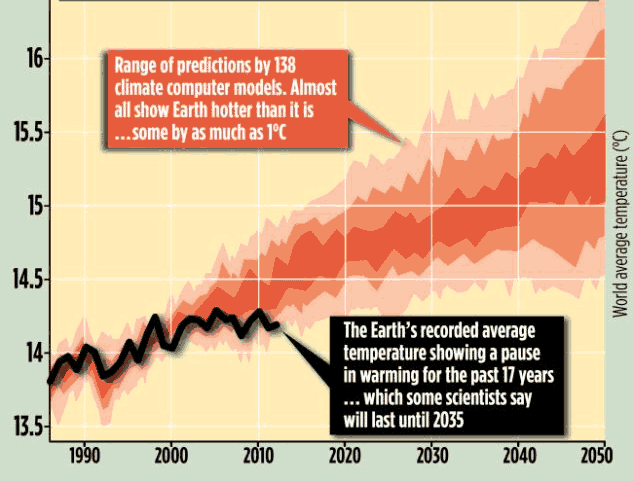The recent report from the UN Intergovernmental Panel on Climate Change (IPCC) treaded lightly on the subject of the pause in global warming over the past 16 years, noting that temperature variability is to be expected, and vaguely referencing theories that rising temperatures are being trapped for now in the "deep oceans." (See IPCC Report Released, Generates Strident Commentary on Both Sides of the Debate.)
Those flat temperatures of late are at odds with the warming models from the IPCC and many other environmental groups.
Now, a new article published in peer-reviewed Journal of Climate Dynamics says we can expect that pause to last another 20-30 years, in large part because existing models well under-estimate the impact of natural climate forces versus the impact of carbon in the atmosphere.
The paper was written by Dr. Judith Curry of the Georgia Institute of Technology and Dr. Marcia Wyatt, and independent scientist. The two say that many climatologists are missing the cyclical nature of temperatures.
Curry and Wyatt say they have identified a climatic stadium "wave," similar to the phenomenon in which a crowd at a stadium stands and sits so that a wave of sorts moves around a sports venue.
In similar fashion, a number of cycles in the temperature of air and oceans, and the level of Arctic ice, take place across the Northern hemisphere over decades. Curry and Wyatt say there is evidence of this going back at least 300 years.
They add that this wave theory may explain both the warming pause and why the computer models did not forecast it.
It also means that a large proportion of the warming that did occur in the years before the pause likely was not due not to greenhouse gas emissions, but to the same cyclical wave – a notion anathema to global warming proponents.
"The stadium wave signal predicts that the current pause in global warming could extend into the 2030s," said Wyatt. This is in sharp contrast with the IPCC's report, which predicts warming of between 0.3 and 0.7 Celsius by 2035.
Wyatt added that "The stadium wave forecasts that sea ice will recover from its recent minimum." She noted that this theory explains why the record low level of Artic ice seen in 2012, which was seen as proof of significant warming by many climatologists, was then followed by the large increase in the ice level in 2013.
There is growing agreement that many of the temperature models exaggerated the effects of CO2 (the level of carbon sensitivity) and that these predictions need to be scaled back.
Dr. Ed Hawkins of Reading University, who was a co-author of the IPCC report, is one of those who has acknowledge the deficiencies of most current climate models, putting the graphic below in one of his blog posts earlier this year.
Almost All Global Temperature Models have Exceeded the Reality

Source: Dr. Ed Hawkins, Reading University
Hawkins added that if the warming pause does last another 10 years or more, and there were no large volcanic eruptions to throw even more carbon into the atmosphere, "then [actual] global surface temperatures would be outside the IPCC's indicative likely range."
Dr. Curry went much further. "The growing divergence between climate model simulations and observations raises the prospect that climate models are inadequate in fundamental ways,' she said.
We simply say that to state that climate science is "settled" is simply not close to accurate, as unhappy as that will make some readers. The science is clearly evolving by scientific inquiry, as it should.
What are your perspectives on this new article? Do you really believe climate science is settled? Let us know your thoughts at the Feedback button below.

|